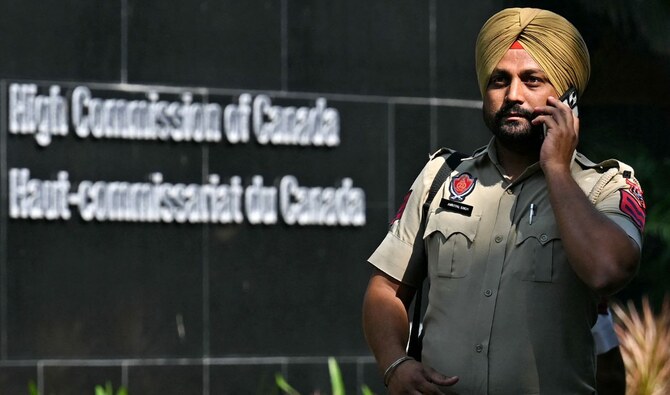NEW DELHI: Relations between India and Canada have reached a historic low as the countries expelled each other’s diplomats in an ongoing row over the killing of a Sikh separatist activist on Canadian soil.
Canadian Prime Minister Justin Trudeau accused India’s government on Monday of “supporting criminal activity against Canadians here on Canadian soil,” and the country’s Foreign Ministry announced the expulsion of six Indian diplomats, including the high commissioner.
The ministry said Canadian police had gathered evidence, which identified them as “persons of interest” in last year’s killing of Hardeep Singh Nijjar, who was gunned down in Surrey, British Columbia.
India immediately rejected the accusations as absurd, and its Ministry of External Affairs said it was expelling Canada’s acting high commissioner, his deputy, and the embassy’s four first secretaries.
Before the announcement, it also summoned the Canadian charge d’affaires and said it was withdrawing its high commissioner and “other targeted diplomats,” contradicting Canada’s statement of expulsion.
“Prime Minister Trudeau has been making these public statements repeatedly, but the evidence that he claims to possess is not available to us so we cannot make any kind of a judgment,” Dr. Ajai Sahni, executive director of the Institute for Conflict Management in New Delhi, told Arab News.
“This is the first time the relationship is so low … It has created a lot of problems and it has done damage to relationships between the two countries for the time being.”
This is not the first time India-Canada relations have been strained. In 1974, after India conducted its first nuclear weapon test, it drew outrage from Canada, which accused it of extracting plutonium from a Canadian reactor, a gift intended for peaceful use.
Ottawa subsequently suspended its support for New Delhi’s nuclear energy program.
“The relationship was also low in the 1980s with the hijacking of an Indian Airlines plane and the bombing of the plane, in which many people died,” said Prof. Ronki Ram, political science lecturer at the Punjab University.
The explosion from a bomb planted by Canada-based militants killed 329 people — the worst terrorist attack in Canadian history. India had warned the Canadian government about the possibility of attacks and accused the Canadian Security Intelligence Service of not acting on it.
But the current strain in relations is the first in which diplomats have been withdrawn.
“This is the first time that the relationship has gone down so low,” Ram said.
“Allegations and counter-allegations will have serious implications both internationally and domestically. The Indian government should look into the allegations and try to address them.”
Nijjar, a Sikh Canadian citizen, was gunned down in June 2023 outside a Sikh temple in Surrey, which has a significant number of Sikh residents. He was an outspoken supporter of the Khalistan movement, which calls for a separate Sikh homeland in parts of India’s Punjab state.
The movement is outlawed in India, considered a national security threat by the government, and Nijjar’s name appears on the Indian Home Ministry’s list of terrorists.
Canada has the largest population of Sikhs outside their native state of Punjab — about 770,000 or 2 percent of its entire population.
“Many Panjabi diaspora are in Canada, and a mini-Punjab has been established there,” Ram said.
“The government is taking an electoral interest in the landscape of Canada also. Those things are becoming very critical.”
















